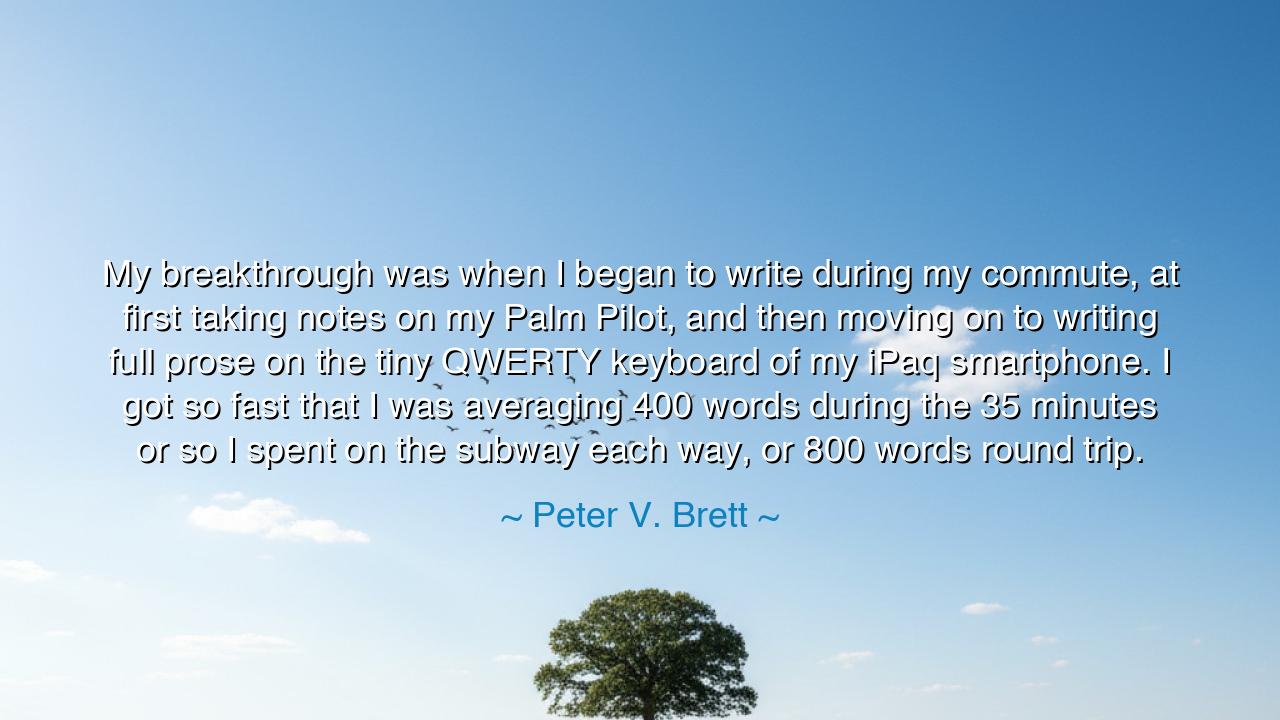
My breakthrough was when I began to write during my commute, at
My breakthrough was when I began to write during my commute, at first taking notes on my Palm Pilot, and then moving on to writing full prose on the tiny QWERTY keyboard of my iPaq smartphone. I got so fast that I was averaging 400 words during the 35 minutes or so I spent on the subway each way, or 800 words round trip.






Hear the words of the scribe and dream-weaver, Peter V. Brett, who revealed the humble origins of his craft: “My breakthrough was when I began to write during my commute, at first taking notes on my Palm Pilot, and then moving on to writing full prose on the tiny QWERTY keyboard of my iPaq smartphone. I got so fast that I was averaging 400 words during the 35 minutes or so I spent on the subway each way, or 800 words round trip.” Though his story is set in the age of machines and glowing screens, its wisdom is eternal, for it teaches us that greatness is born not in ideal conditions, but in the fierce resolve to use whatever time and tools lie at hand.
The meaning is this: the path to mastery does not always begin with grand halls, spacious chambers, or perfect instruments. Instead, it often begins in obscurity, in small spaces, with simple tools, during moments others would let pass unused. Brett’s breakthrough was not the discovery of hidden talent, but the transformation of idle minutes into a forge of creation. The subway became his sanctuary, the smartphone his parchment, and persistence his weapon. From fragments of time, he built entire worlds.
The ancients themselves knew this truth. Consider the story of Epictetus, who, though born a slave, used the fragments of freedom in his day to contemplate, to reason, and to sharpen his philosophy. He did not wait for liberty before beginning his journey of wisdom; he began within the narrow confines of his bondage. In time, his words outlived kings. So too did Brett turn confinement into creativity, and what seemed a mere commute became the cradle of his legend.
History, too, offers the tale of Alexander Hamilton, who, as a young man in poverty, scribbled essays and letters in the margins of his work and study. He seized upon the scraps of time, refusing to waste them, and his words caught the attention of men who would later help him rise to shape a nation. Like Brett, Hamilton’s gift was not only in brilliance, but in the discipline of writing wherever and whenever he could. Greatness is not given to those who wait for perfect conditions; it is given to those who use what they have.
There is also a deeper meaning. Brett’s story is not only about productivity, but about the spirit of adaptation. He did not lament the small screen or the tiny keys. Instead, he embraced them, mastered them, and through them unlocked his creativity. The wise understand that tools are secondary; it is the will and the discipline that matter. The chisel may be dull, the canvas small, the hours fleeting—but the artist who adapts will still carve, still paint, still write.
The lesson for us is luminous: do not wait for perfect time, perfect space, or perfect tools to pursue your calling. Begin with what you have, where you are. The idle minutes you overlook may be the very soil in which your dream will grow. Transform your commute, your waiting, your pauses into opportunities. Remember Brett, who turned the rumble of the subway into the rhythm of words, and from that rhythm crafted a career. Breakthroughs are not born from ease, but from persistence.
Practical actions must follow. Identify the fragments of your day that lie wasted. Redeem them. Carry a notebook, a device, or even the readiness of mind to think deeply and record your insights. Do not despise the small beginnings; measure progress in consistency, not in grandeur. Set goals that transform minutes into milestones, and soon, like Brett, you will find that the small streams of effort merge into a mighty river of accomplishment.
For remember this eternal truth: greatness is not a gift of circumstance, but of discipline. Brett’s words teach us that with will and perseverance, even a crowded train can become a temple of creation, and even a tiny keyboard can write epics. Seize the time that others waste, and you will discover that your own breakthrough waits, hidden in the ordinary hours of your life.






AAdministratorAdministrator
Welcome, honored guests. Please leave a comment, we will respond soon